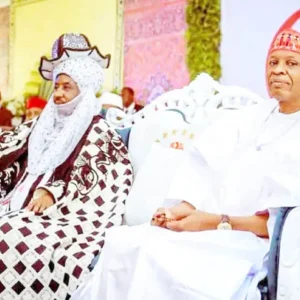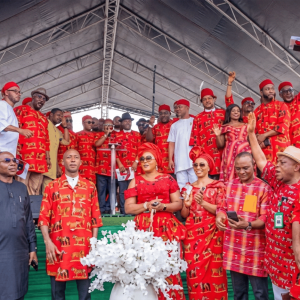•Tinubu and 1999 Constitution
Nigerians from all walks of life today pushed back against what they called an outdated Constitution during the National Public Hearing on the review of the 1999 Constitution organised by the House of Representatives.
The citizens, including civil society groups, traditional leaders, security agencies, and professional bodies, called for greater inclusion, security and electoral reforms, and recognition of women, youth, persons with disabilities, and practical fiscal federalism, reports The Guardian.
The Constitutional Review involves 87 amendment bills, with some key areas generating robust debate. These areas were State and Community policing, reserved seats for Women and Persons with Disabilities, electoral reforms, and states creation.
Speaking at the event, President Bola Tinubu reaffirmed his administration’s commitment to constitutional reforms that would strengthen Nigeria’s institutions, promote justice, and guarantee fundamental rights.
He also called on Nigerians to actively participate in the ongoing constitutional review process, saying it is a historic opportunity to entrench good governance, inclusivity, and sustainable development.
Speaking through the Secretary to the Government of the Federation (SGF), Senator George Akume, at the National Public Hearing on the Review of the 1999 Constitution (as amended), Tinubu described the exercise as a golden opportunity to advance democracy and nation-building.
“The Constitution is the supreme law of the land. It is not static, but a living document that must continually respond to the realities, aspirations, and challenges of our people,” Tinubu said.
He stressed that the ongoing review must aim to deepen federalism, entrench equity and accountability, and provide Nigerians with stronger democratic institutions that safeguard their freedoms.
Deputy Speaker Benjamin Kalu, who chairs the House Committee on Constitution Review, declared that the exercise is Nigeria’s most inclusive constitutional review in history, saying that its outcome must reflect the voices of citizens rather than the preferences of the political elite.
Kalu emphasised that the legitimacy of the new amendments will depend on their acceptance by Nigerians themselves.
He described the current stage of the process as the culmination of months of public consultations across the six geopolitical zones, during which citizens, civil society groups, traditional leaders, security agencies, and professional bodies submitted memoranda and testimonies.
Before the commencement of the hearing, hundreds of women had protested to push for a bill that would add women-only seats in the Senate and House of Representatives.
A caravan of buses, vans, and a truck, blasting lively Afrobeats, wound its way through the city streets, led by protesting women that were demanding representation.
They subsequently presented their memoranda, saying that only inclusive governance could improve governance in the country.
A representative of the Nigerian Armed Forces requested clarification for the omission of proposed legislation seeking to review the Armed Forces Act in the submitted compendium, stating that inclusion is critical for a robust legal framework to strengthen national security and cohesion.
“The Armed Forces especially requests clarification and reason for the omission to better understand the status of the submission and the way forward. It will be appropriate for us to be informed of the reason for such an omission,” he stated.
Speaking on behalf of the National Council of Traditional Rulers, Etsu of Nupe, Yahaya Abubakar, lamented the removal of traditional authorities’ roles from the 1999 Constitution.
Describing traditional rulers as a bridge between governance and the governed, he called for their formal recognition. He assured governors that the move was not to whittle down their powers as chief executive officers of states.
“We urge this committee to ensure that our roles are integrated into the Constitution, so we can continue to mediate, administer, and maintain peace effectively.”
President of the Network of Women with Disabilities, Lois Auta-Udonkanta, observed that the PWDs are at zero level of participation in governance.
“We are excluded. We are underrepresented in every sector. In Kenya, we have a visually impaired woman who is a senator in Kenya’s parliament. What is Nigeria doing? As a team, it is time we move from exclusion to inclusion, from inclusion to participation, and from participation to representation. We also need to move from policy to practice,” she stated.
Former Minister for Information, Chief Frank Nweke Jnr, said there is need to allow for diaspora voting and independent candidacy with a view to expanding democratic inclusion in the country.
Nweke noted the Nigerian diaspora’s economic contribution, estimated at over $20 billion in remittances in 2024, and argued that Nigerians abroad should have the constitutional right to vote.
Similarly, a representative of the Alaafin of Oyo submitted proposals for the creation of additional local government areas in Oyo State, arguing that such reforms would improve administrative efficiency and equitable representation.
Commandant General of the Nigeria Security and Civil Defence Corps (NSCDC), Dr. Ahmed Abubakar Audi, who was represented, called for constitutional recognition of the corps’ mandate and authority.
He called for the amendments to Sections Two and Four of the Constitution to formalise their role, stating that the corps was involved in key responsibilities, including protection of government infrastructure, combating illegal mining, ensuring school safety, and regulating private security operators.
A representative of the Peoples Democratic Party (PDP) noted that ahead of the 2027 elections, there is need for reforms to guide elections, especially the provision for electronic transmission of results.
He said this measure could enhance transparency and ensure free and fair elections, insisting that future elections must adopt mechanisms that instill confidence that votes are accurately counted.
Speaking earlier, Speaker of the House Abbas Tajudeen described the hearing as a significant moment in Nigeria’s democratic journey.
He praised the strong participation of women and reaffirmed support for proposals reserving parliamentary and ministerial seats for women.



























